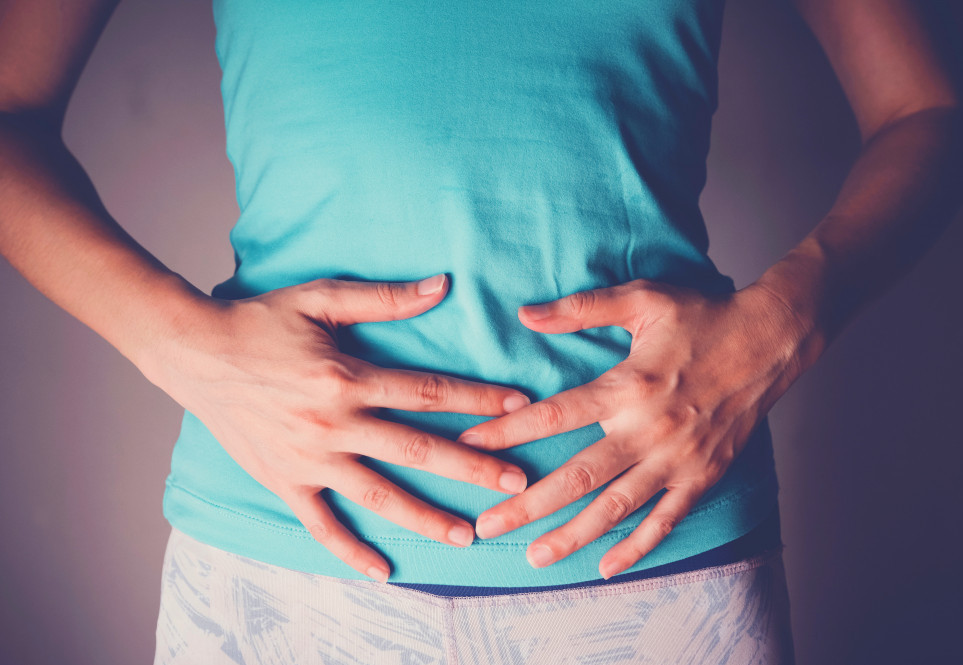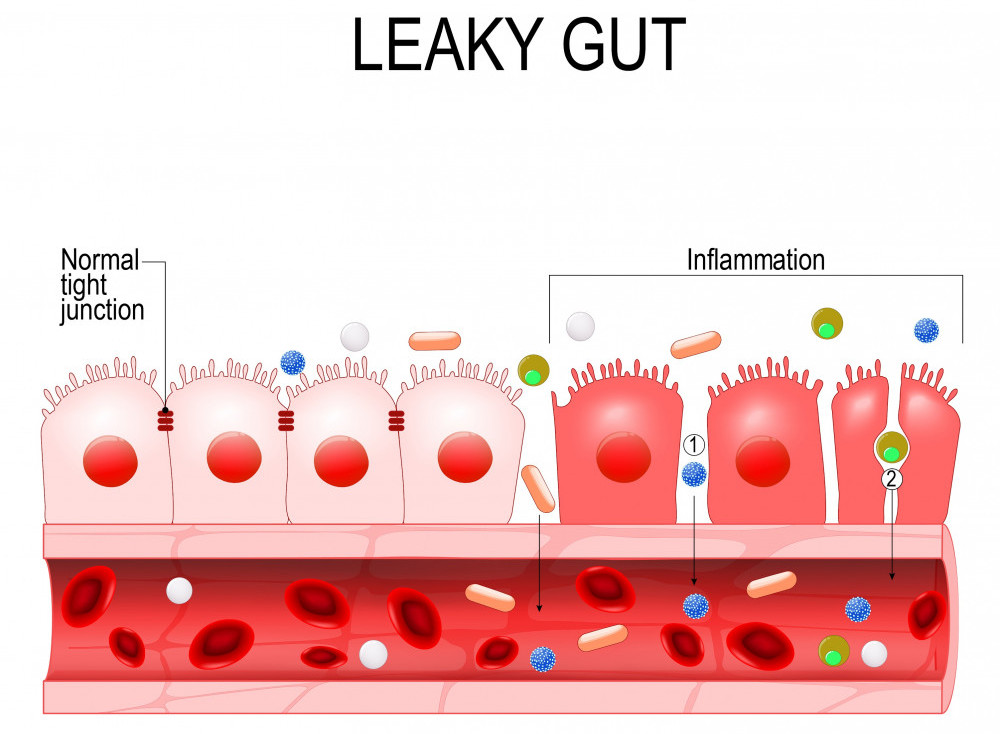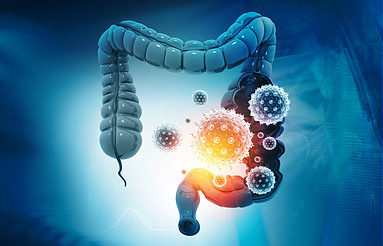What Is Intestinal Permeability? A Common Contributor to Autoimmunity, Food Sensitivities, and Chronic Inflammation
Intestinal permeability is a significant and common underlying cause of chronic symptoms and illness.
and common underlying cause of chronic symptoms and illness.
Here we will explore what intestinal permeability is, its primary causes, signs and symptoms, and how to address this imbalance.
What Is Intestinal Permeability?
Intestinal permeability, also called leaky gut or intestinal hyperpermeability, is a gut imbalance that occurs when the intestinal lining/barrier becomes permeable, allowing particles from the intestines to leak into the bloodstream.
A healthy intestinal lining/mucosa is normally only semi-permeable, comprised of a layer of epithelial cells that are joined together by tight junction proteins. These tight junctions basically act as the gate keeper of your intestinal lining, only allowing very small nutrient particles to pass through into your bloodstream and keeping larger, harmful substances out such as bad bacteria, pathogens, toxins, and food particles.
The epithelial lining of the intestines can become damaged from irritants such as gluten, antibiotics, synthetic food preservatives, and more, which eventually causes the tight junctions to widen. This then allows the contents of the intestines to leak into bloodstream and travel throughout the rest of the body.
These particles are treated by the body as “foreign invaders” because they aren’t supposed to be there. Therefore, the body initiates an immune response against these particles (producing antibodies, pro-inflammatory cytokines, and more) which can lead to chronic inflammation, autoimmunity, food sensitives, allergies, and much more.

Primary Causes of Leaky Gut
There are several primary causes of intestinal permeability which include:
-
Poor Diet
Diets that include high amounts of sugar, grains, processed foods, synthetic food additives and preservatives, and Genetically Modified Organisms/GMOs can lead to leaky gut.
All of these components can significantly irritate the gut lining, causing its tight junctions to widen. These dietary elements, especially excess sugar, are also very inflammatory which can contribute to tissue damage within the GI tract.
Diets high in conventional dairy products can also contribute to leaky gut in that dairy tends to be inflammatory and can irritate the gut lining. 
-
Prescription Antibiotics
Antibiotics indiscriminately kill all of the bacteria in the gut, including the good bacteria and bad bacteria. A solid balance and strong population of good bacteria, or probiotics, are needed to maintain a healthy microbiome and strong intestinal lining. Your microbiome is the collection of microbes that reside in your intestines and they play a large role in the health of the rest of the body, especially in supporting a healthy immune system.
When these bacteria are killed off, gut dysbiosis occurs, which can lead to leaky gut because the pathogenic bacteria are then allowed to flourish, causing intestinal lining irritation, and eventually widening the tight junctions of the intestinal wall.
These good bacteria also play a role in maintaining the health of epithelial cells by providing them with energy, which helps to keep the gut lining strong. When they are no longer present in sufficient amounts, gut lining integrity will weaken.
-
Chronic Stress
When the body is under stress, especially chronic stress, it will mobilize all of its resources to support the “fight or flight” response so that the body is seemingly more prepared to take on what it percieves to be an active threat.
This means that some bodily systems aren’t attended to as they usually are, because they are seen as less important to our immediate survival.
The digestive system is one such system. Lowered digestive function caused by chronic stress can then result in a weakened intestinal lining, which can lead to leaky gut.
Furthermore, one of the main stress hormones produced by the adrenal glands, cortisol, can become highly inflammatory when produced at high levels. This inflammatory state can then damage the gut lining over time, which also contributes to intestinal permeability.
Lastly, when the body is under chronic stress, the immune system will become weakened as well, which can make the body more susceptible to gut infection. Having a high presence of pathogens in the gut can irritate the gut lining, leading to leaky gut. 
-
Toxins
We are all exposed to many toxins in our world today including water contaminants, pesticides on produce, synthetic chemicals in plastics, conventional cleaning and personal care products, and more. These toxins have a very detrimental impact on the body and can greatly impact gut health.
They act as an irritant and over time, can damage the gut lining leading to intestinal permeability.
-
Gut Infection
Common gut infections such as intestinal parasites, candida overgrowth, and Small Intestinal Bacterial Overgrowth/SIBO all have a negative impact on gut health and subsequently on the integrity of the gut lining.
The pathogenic bacteria, parasites, and fungus that are involved with these infections all greatly irritate and weaken the intestinal walls which can lead to leaky gut.
Click here for much more information on intestinal parasites. 
Signs and Symptoms of Leaky Gut
There are many signs and symptoms of intestinal permeability which include:
- Chronic fatigue
- Abdominal bloating
- Digestive upset such as constipation, diarrhea, and gas
- Heartburn/acid reflux
- Abdominal pain
- Small Intestinal Bacterial Overgrowth/SIBO
- Lowered immune function and susceptibility to infection
- Food sensitivities
- Allergies
- Nutrient deficiencies
- Arthritis
- Joint pain
- Autoimmune conditions such as lupus, Hashimoto’s Thyroiditis, type 1 diabetes, and more
- Hormone imbalances such as estrogen dominance
- Thyroid imbalance
- Weight fluctuations without a change in diet
- Headaches and/or migraines
- Brain fog
- Anxiety
- Depression
- Insomnia
- Menstrual irregularities
- Skin sensitives and rashes
- Acne
- More

How to Address Intestinal Permeability
Intestinal permeability is addressed using what is often referred to as the “4 R” approach:
-
Remove
Remove problem foods that are causing gut irritation. These commonly include gluten, excessive grains, conventional dairy, soy, and excess sugar.
These can also include synthetic food additives in processed foods and pesticides from conventional produce.
Sticking to a fresh, whole food eating plan and aiming to include as much organic food and produce as possible are all very helpful to nurture the gut and repair the gut lining.
This step can also involve addressing one’s other contributing causes such as lowering stress, reducing exposure to toxins by using natural skincare, natural cleaning products, using glass or stainless steel vs. plastic to drink out of, and using a high quality water filter to reduce exposure to water contaminants.

-
Replace
Replace digestive enzymes, stomach acid/hydrochloric acid, and optimize bile flow with bile flow supports to encourage optimal digestion.
Supporting the body’s ability to optimally digest food has a very positive impact on the gut lining because this allows epithelial cells to heal and strengthen.
-
Repair
Repair the damaged gut lining with various natural agents that help to soothe the intestines and repair the damaged tissue.
These include:
This is a short chain fatty acid that is tremendously helpful for nurturing the gut environment and supporting a healthy gut.
An age-old healing tool that helps to soothe the stomach and intestines and promote the self-healing nature of the body.
-
- Marshmallow Root
A powerful herbal remedy for soothing the gut and promoting gut lining repair.
-
- Slippery Elm
An effective herbal remedy for soothing the intestinal lining.
A foundational mineral that our bodies rely on for many functions including supporting the healing of bodily tissues such as the intestinal lining.
Other agents such as collagen are often recommended, however it is important to remain aware that collagen is high in histamine and glutamate. These can exacerbate symptoms if one has conditions such as Biotoxin Illness/Mold Toxicity, mineral imbalances such as Copper Toxicity, and gene variants that render one sensitive to glutamate, which is an excitatory neurotransmitter.

-
Reinoculate/Rebalance
Reinoculate the gut with good bacteria/probiotics in order to create a healthy bacterial balance, strengthen the gut lining, support digestion, immune function, and nutrient absorption.
Including prebiotics are also helpful, which act as food for probiotics to thrive on. Some good sources of prebiotics include fiber, jerusalem artichoke, inulin, dandelion greens, garlic, asparagus, and onions.
Click here to check out my top 5 recommendations for probiotics, all of which have helped me to heal my gut successfully.
In Closing…
As we’ve explored here, intestinal permeability is a common, highly consequential imbalance that is at the root of many symptoms and health conditions.
Nurturing our gut health is one of the most important steps we can take in achieving and maintaining optimal health, and addressing leaky gut is certainly a key area to consider on one’s healing journey.
REFERENCES